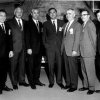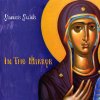Editors Gorup and Obradovic have collected stories from thirty-five outstanding writers in this first English anthology of Serbian fiction in thirty years. The anthology, representing a great variety of literary styles and themes, includes works by established writers with international reputations, as well as promising new writers spanning the generation born between 1930 and 1960. These stories may lead to a greater understanding of the current events in the former Yugoslavia.
.Crodanovic, Dragan Velikic, Radoslav Petkovic, Svetislav Basara, Mihailo Pantic, Sasa Hadzi-Tancic, Vladimir Pistalo, and Nemanja Markovic.
"The anthology offers a rich variety of storytelling that ranges from traditional realism to magical realism and postmodernism. Whether describing peasant life or urban dreamscapes, these are tales well told. highly recommended for literature collections in academic and large public libraries." (Library Journal)
"The stories offer a wide variety of themes and styles and cread has an M.A. in French literature and an M.A., M.Phil., and Ph.D. in linguistics from Columbia University. She received a Fulbright award to travel and lecture in Yugoslavia in 1986 and an ACLS grant to travel to Slovenia in 1991. Gorup is the author of The Semantic Organization of the Serbo-Croatian Verb, published in Germany in 1987, and has written numerous research articles and reviews on linguistics and on Serbian literature. She is guest editor for an issue of the Review of Contemporary Fiction dedicated to Milorad Pavic to be published in 1998, and is the president of the North American Society for Serbian Studies. She currently teaches in the Slavic Department of Columbia University.
From Library Journal
Owing to the turmoil that has scarred the Serbian landscape over the past few years, the mention of that country tends to bring to mind savage images of intolerance and war. In her excellent introduction, Gorup expresses the hope that this collection of Serbian stories will provide its readers with a clearer view of the region and its ongoing conflicts. In the title story, by Filip David, a father tells his son that "the main source of understanding is the heart." Good advice for the reader as well, for these are essentially stories of the heart?tales that lead ever deeper into life's dark forest along the road to death. Time, change, emptiness, and loneliness are prominent themes. Ethnicity is present, too, generally in the background but occasionally as the focal point: in Mladen Markov's "The Banat Train," a little boy and his family are mistreated because of their nationality, while Milorad Pavic offers a parable about Europe and the Balkans in "The Wedgewood Tea Set." The anthology offers a rich variety of storytelling that ranges from traditional realism to magical realism and postmodernism. Whether describing peasant life or urban dreamscapes, these are tales well told. Highly recommended for literature collections in academic and large public libraries.?Sister M. Anna Falbo, Villa Maria Coll. Lib., Buffalo
Copyright 1998 Reed Business Information, Inc.
About the Author
Nadezda Obradovic graduated from the University of Belgrade. She has edited and translated several special issues of literary periodicals devoted to African literature; she reviews for World Literature Today and is the editor and translator of nine books, including African Rhapsody and Looking for a Rain God. She is the 1997 recipient of the Golden Badge Award for her contribution to the culture of Serbia.





